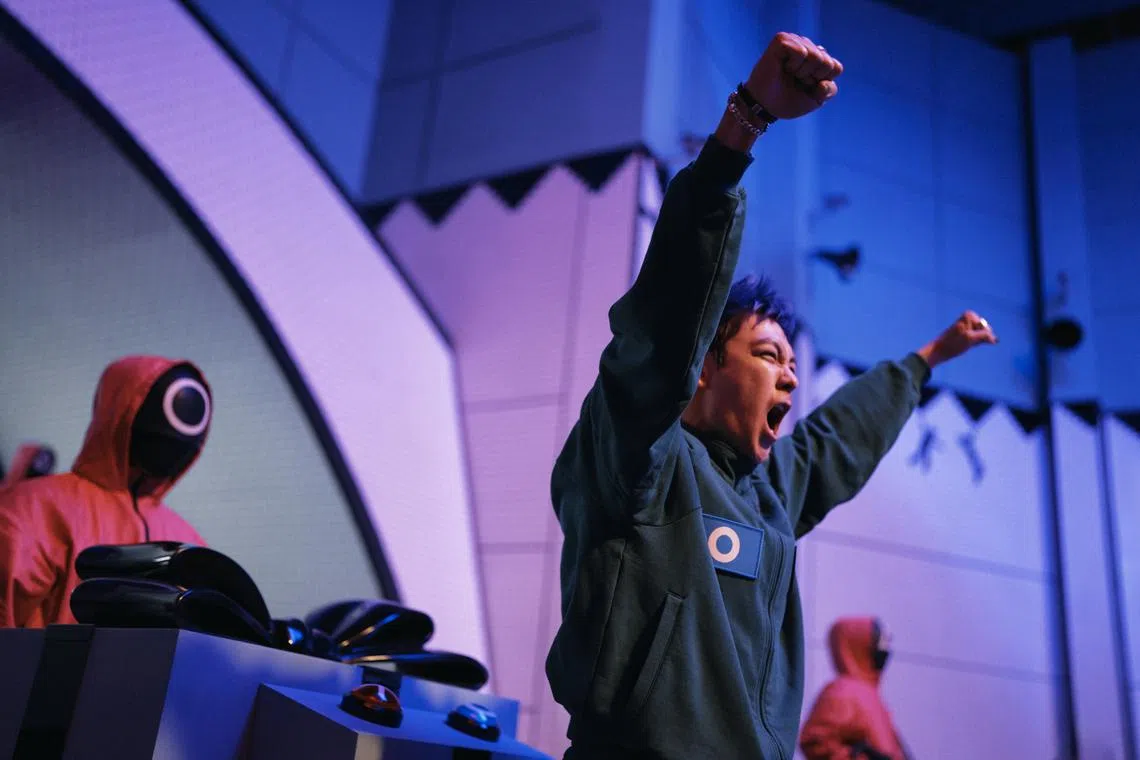In Squid Game 2, former BigBang rapper T.O.P plays bizarre version of himself
Sign up now: Get ST's newsletters delivered to your inbox

T.O.P plays Thanos, a rapper with drug problems seemingly inspired by his real life, in the second season of Squid Game.
PHOTO: NETFLIX
Follow topic:
SEOUL – The second season of hit Netflix K-drama Squid Game (2021 to present) is not exactly built for laughs, but it serves up plenty of second-hand embarrassment through one singular force: Thanos, Player 230.
He is played by former K-pop star Choi Seung-hyun, 37, better known as T.O.P and the former rapper of K-pop boy band BigBang.
Named after the Marvel villain, the purple-haired menace wastes no time establishing himself as a chief antagonist.
High on pills stashed in his pendant, he pushes fellow contestants to their deaths during a game of Red Light, Green Light. But unlike the first season’s brutally efficient gangster villain Deok-su (Heo Sung-tae), this villain operates purely in the realm of the bizarre.
Thanos plays more clown than criminal, a walking parody of wannabe rapper stereotypes turned up to eleven. He punctuates threats with random English – and, in at least one instance, Spanish, with “Senorita!” – drops impromptu rap verses mid-conversation, and struts through deadly games like he is shooting a music video.
His dialogue seems precision-engineered for maximum cringe – a Gen-Z caricature on steroids who, with the help of drugs, treats life-or-death situations like an extended audition for a hip-hop reality show.
The casting carries its own loaded history, one that straddles fiction and reality.
Choi’s own career imploded in 2017 after he was caught consuming drugs with a K-pop trainee while he was serving mandatory military service. Though it was marijuana rather than harder drugs, it was a scandal that led to his swift cancellation in South Korea’s zero-tolerance entertainment industry.
After a 10-month suspended sentence and a demotion to public service duty, he largely disappeared from view.
His only public appearance came during BigBang’s brief 2022 reunion for the song Still Life,
His surprise casting in the Netflix smash hit sparked heated debate even before release, with critics questioning both the ethics of featuring a former drug offender and Choi’s acting skills, given his previously mixed reviews in films like Commitment (2013) and Tazza: The Hidden Card (2014).
But Squid Game creator and director Hwang Dong-hyuk came to his defence again and again. “He was the best person for the role,” Hwang told South Korean media in November, praising Choi’s “courage” in accepting the part.
Indeed, sometimes playing yourself – or rather, society’s worst caricature of you – takes more courage than playing someone else entirely, and the response since the show’s Season 2 premiere on Dec 26
South Korean media and social platforms have uniformly savaged both the performance and the casting decision, mixing criticism of Choi’s acting with moralising commentary. One reviewer from a major newspaper asked pointedly: “The director speaks of (Choi’s) courage – but what courage?”
International viewers, however, saw something different – a meta-commentary and a self-reflexive statement on South Korea’s stringent drug laws and notoriously unforgiving attitude towards drug use.
For example, one netizen praised Choi for “beating the druggie heat by acting as a druggie in one of the biggest series in the world”.
According to streaming analytics website FlixPatrol, the sophomore season of Squid Game is currently the most-watched series on Netflix, becoming the platform’s No. 1 series just a day after its premiere. THE KOREA HERALD/ASIA NEWS NETWORK

